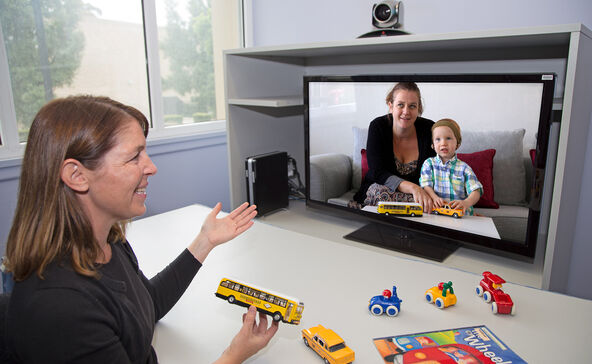- Vision
- Hearing
Groundbreaking research by a NextSense Institute PhD graduate is earning worldwide recognition, adding evidence to the field and generating confidence in support of the benefits of telepractice for family-centred early intervention.
NextSense Institute is the higher education and research arm of NextSense. It exists to teach and inspire the next generation of specialists in our field and help them reach their own potential.
We do this in affiliation with Macquarie University. Together with the University, we developed the Master of Disability Studies program. We offer the opportunity to study for this qualification, or for the degrees of Master of Research or Doctor of Philosophy. All degrees are awards of Macquarie University.
Potential impact of this new evidence
Dr Melissa McCarthy completed her studies through NextSense Institute and the University of Newcastle[1], submitting her PhD thesis in October 2020. Melissa’s thesis was titled ‘Comparison of Telepractice and In-Person Models of Family-Centred Early Intervention for Children who are Deaf or Hard of Hearing’.
Following rigorous examination by a panel of international early intervention and telepractice experts, Melissa’s degree was conferred in March. Her research adds much-needed additional evidence about the factors that influence the successful delivery of early intervention through telepractice.
One of Melissa’s examiners described her work as ‘unique, extensive, and important’, noting that it ‘has major implications for service delivery worldwide’.
In their report the examiner noted that, in many parts of the world, there are considerable barriers experienced regarding the delivery of family centred early intervention for deaf or hard of hearing children. They concluded that Melissa’s research ‘increases confidence not only in the comparability of this mode of service delivery to in-person delivery, but that telepractice may actually enhance the delivery of…family centred early intervention’.
This was high praise and reinforces the importance of this research. Why does it matter? It matters because the ‘barriers’ that the examiner referred to were never more apparent than during the lockdowns associated with COVID-19 when early intervention specialists around the world were unable to see children and families in person.
[1]
Melissa commenced her PhD studies prior to 2017 when NextSense Institute (formerly RIDBC Renwick Centre) was affiliated with the University of Newcastle.
Telepractice in a pandemic
With government-mandated lockdowns and other public health measures in place due to COVID-19, NextSense (formerly RIDBC) was able to extend the delivery of services via telepractice to many more families. Our specialist knowledge and expertise in telepractice, particularly within NextSense Institute (formerly RIDBC Renwick Centre), came to the fore. Combining with fast mobilisation of IT services, a crisis response team enabled early intervention, educational services, and specialist services such as cochlear implant support to pivot to telepractice almost immediately.
It is thanks to our evidence-based approach, informed by the latest research— research like Melissa’s—that NextSense could continue supporting families in the most effective way, via telepractice. Backing up Melissa’s research, a survey of 157 families who received early intervention services from NextSense (88% of which had transitioned from in-person services to telepractice) revealed that 64% felt just as supported, or even more supported via telepractice than they had been prior to the change.
Overall, families reported very high levels of self-efficacy in managing their children’s needs and encouraging their children’s language and communication development with the support they were receiving via telepractice. That’s a remarkable outcome.
Melissa’s work is an important contribution to the development of best practice in early intervention by telepractice. The benefits of telepractice were clear last year when needed most—when, as an organisation, we were able to turn quickly and effectively to telepractice in confidence that we were delivering high quality effective services to all our client families through that medium.
Educating the next generation of experts
There are now almost 200 students enrolled in our Master of Disability Studies program. In 2020, 54 students completed their studies and qualified for the degree from Macquarie University.
The Master of Disability Studies offers the advanced professional the preparation required to qualify as a Teacher of the Deaf, a teacher of students who are blind or have low vision, or a professional working with people with sensory disability.
Melissa’s PhD illustrates how, through our postgraduate education and continuing professional development offering, we are educating the next generation of experts and pioneers. It’s my privilege to be supporting this next generation, to advance knowledge and skills for the benefit of people who are deaf, hard of hearing, blind or have low vision.
Study at NextSense Institute
NextSense Institute delivers continuing professional education for health and education professionals who support people who are deaf, hard of hearing, blind or have low vision. Find out more.
